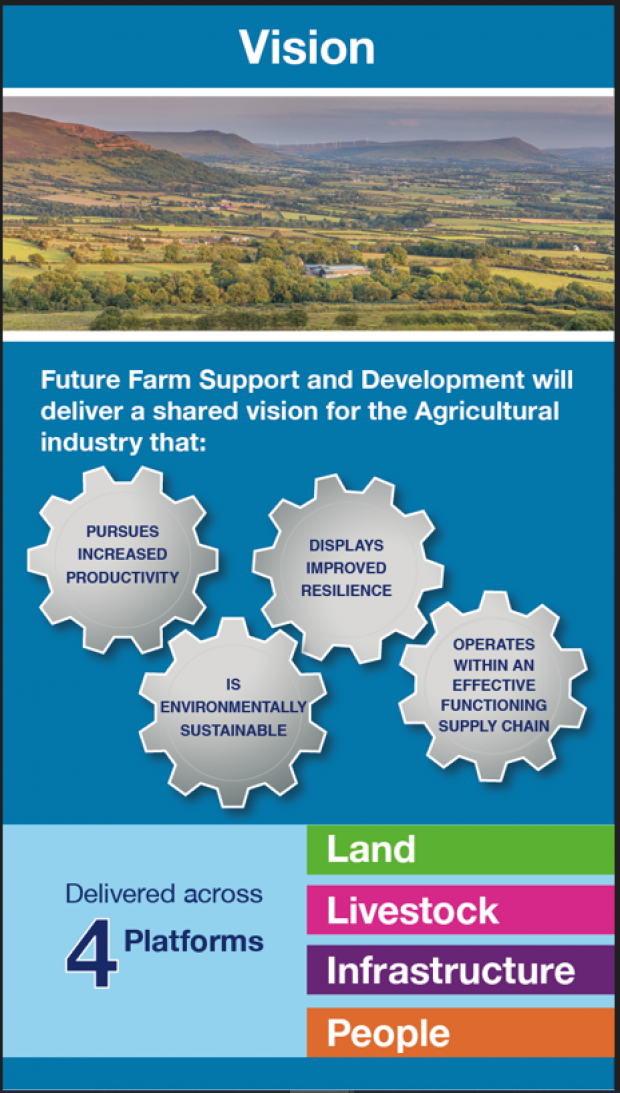
- Is environmentally sustainable in terms of its impact on, and guardianship of, air and water quality, soil health and biodiversity, while making its fair contribution to achieving net zero carbon targets. This outcome is an integral part of the new Green Growth Strategy and associated Climate Action Plan.
- Displays improved resilience to external shocks (such as market and currency volatility, extreme weather events, etc.) which are ever more frequent and to which the industry has become very exposed.
- Operates within an integrated, profitable, efficient, sustainable, competitive and effective functioning supply chain, with clear transmission of market signals and an overriding focus on high quality food and the end consumer
Future Farm Support and Development will help businesses, no matter where they farm, to maximise the sustainable returns they can achieve from the assets at their disposal. This vision has been shaped around four platforms: Land, Livestock, Infrastructure and People.
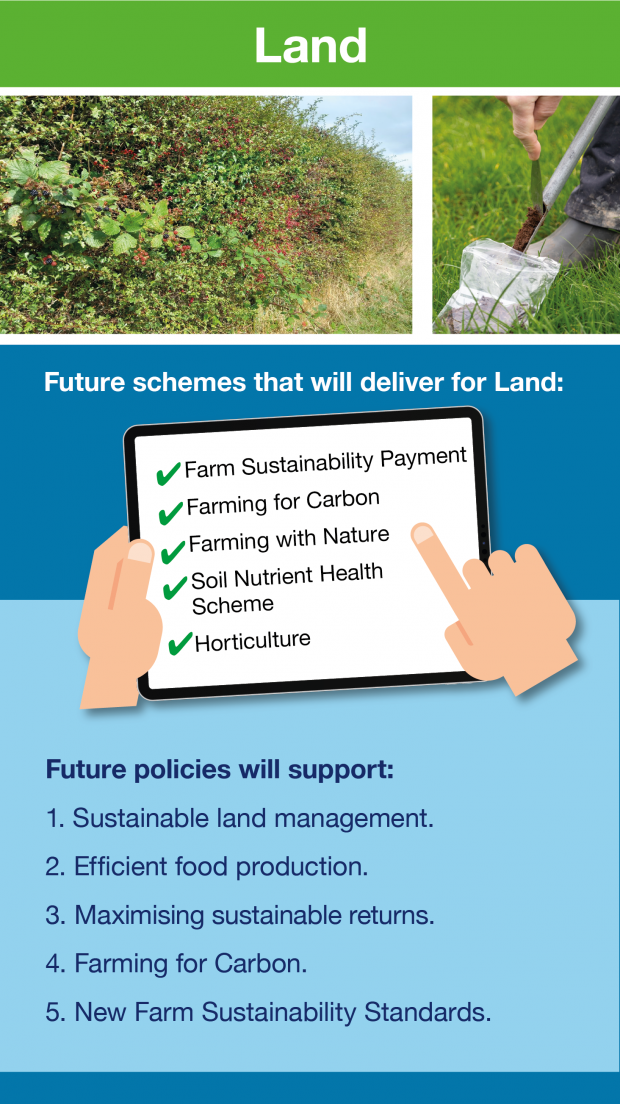
To help and support you to do this, DAERA has committed to provide support to ensure you can survive the ups and downs of world markets, climate and environmental challenges to meet the widening demands. That is why some safety net support is needed and DAERA is putting in place a Farm Sustainability Payment for those farms that operate to basic sustainability standards and conditions.
To avail of the Farm Sustainability Payment, you must participate in the Soil Nutrient Health Scheme which will provide you with a clear understanding of the soil nutrient status of each field on your farm. Going forward, this will help you to develop a Nutrient Management Plan to achieve and maintain good soil health and nutrient status. This in turn will protect our waterways by ensuring that only the nutrients required by the growing crops in the field are provided and that any excess does not end up in our streams, rivers and lakes. It will help you to increase your farm efficiency, producing the same output of grass for grazing, and silage and crops for harvesting, for less input.
Your land can offer so much more. In addition to a healthy, growing crop or thriving livestock, it can also provide important resources in the battle against climate change through the tonnes of carbon stored in the soil or in the trees and hedgerows. DAERA is developing ways of understanding the carbon storage assets that most farms already have and their potential to reduce emissions or capture more. The aim will be to encourage ‘Farming for Carbon’ to be integrated into everyday farming practices.
The habitat that hedges and trees around fields offer is well-recognised on most farms. But hedges and trees can also deliver much more, connecting habitats, delivering biodiversity and providing the outstanding landscape NI is renowned for. The Farming with Nature Package will provide the support needed for you to see that there can be profitability in managing and enhancing such areas, and that this can be as attractive financially as your traditional livestock or cropping enterprises. Those of you who go above and beyond the minimum requirements will see this extra effort rewarded under the Farming with Nature Package.
Support for the Horticulture sector will aim to increase local horticulture sector productivity and help ensure the sustainability of the food supply by increasing local resourcing.
So, the view out of your kitchen window will begin to change over the next decade. You will start to see taller, thicker hedges that you have actively managed and clumps of planted oak or alder saplings growing along with new mixed herb and clover reseeds that you have established. The results of careful nutrient management, based on soil analysis, will have yielded benefits in terms of reduced fertiliser costs or greater output. The accompanying improvement in the quality of the water in the burns running through the land and the loughs or rivers they run into may not be visible, nor will the additional tonnes of carbon captured in the fields and hedgerows and in the soil, but they will be extremely valuable outputs that will enhance our stock of natural assets for current and future generations.
The land will be producing food as before, but it will be doing so more efficiently and meeting the demands of society and the environment. We will be able to hand over resilient, productive and environmentally sustainable farm businesses to the next generation.
Follow links to information on Future Schemes and Measures:
- Farm Sustainability Payment
- Farming for Carbon
- Farming with Nature
- Soil Nutrient Health Scheme
- Horticulture
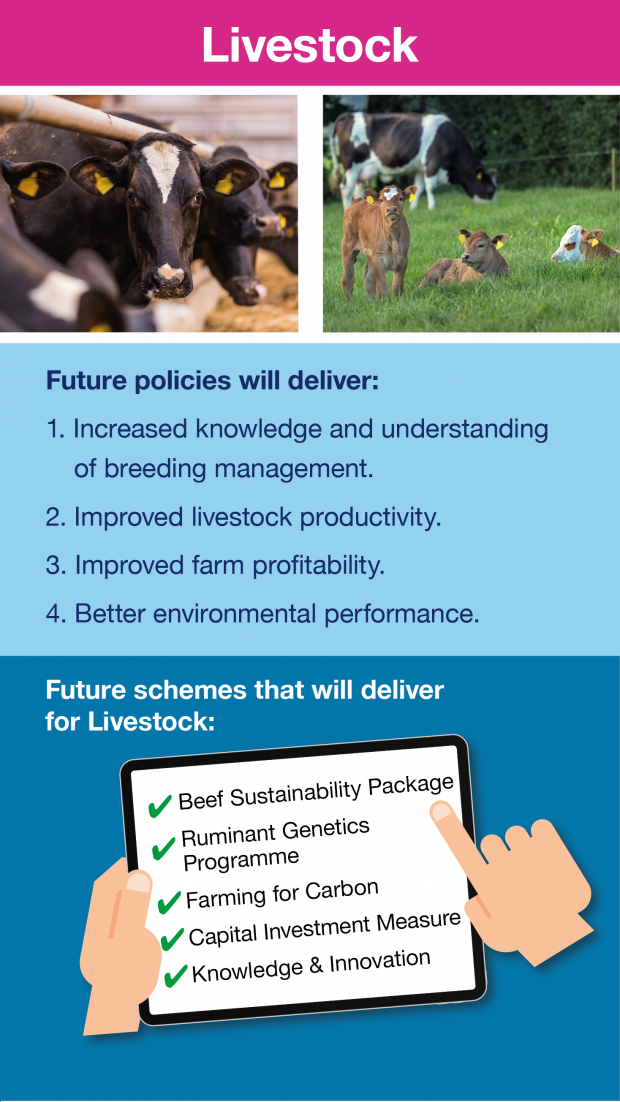
Beef cattle and sheep farming in Northern Ireland is our predominant agricultural activity, and as such, it is a large contributor to agricultural output. However, it produces the lowest output per hectare of all the Northern Ireland sectors.
The Beef Sustainability Package being developed by DAERA aims to improve the efficiency of this sector to help drive efficiency and sector performance, thereby addressing sector vulnerabilities by increasing profitability.
For the suckler cow producer, this means focusing on breeding management and herd fertility and health, to help reduce the amount of time that animals spend on farm in an unproductive state. Not only will this help to improve herd performance, but it will also deliver environmental benefits by reducing carbon and other emissions and indeed, the carbon footprint of the farm as a whole. The suckler cow element of the Beef Sustainability Package will provide support based on meeting targets for the age of first calving for new/replacement heifers and the calving interval for cows in a herd.
In relation to beef producers, the focus is on the age at slaughter. Cattle finished at an earlier age can help drive both improved productivity and environmental performance. Through the age at slaughter element of the Beef Sustainability Package, DAERA will provide support aimed at reducing the age at slaughter for clean beef animals through measured steps to 26 months.
DAERA recognises that to achieve the targets set for the Beef Sustainability Package, some changes to the current practices on farms will be required. Training and support will be available to help you implement these changes.
Options provided by the industry to improve the overall performance and resilience of the sheep sector are being considered.
It was recently agreed that the CAFRE Dairy Enterprise is to be developed as an exemplar in Sustainable Milk Production and that CAFRE both demonstrates and delivers knowledge programmes on reducing the carbon footprint for farms to help achieve the climate change targets that have been set for Northern Ireland. Key to this, and mirroring the approach for suckler cow producers, is age at first calving and replacement rates within the dairy sector. The use of feed additives to reduce enteric methane emissions will also be adopted and demonstrated as we develop Farming for Carbon.
Currently, Northern Ireland cattle and sheep farmers are predominately making breeding decisions in the absence of performance data and genetic merit. The long-term aim must be to increase the annual rate of genetic gain in the ruminant livestock sectors to drive productivity, resilience, animal health and welfare and environmental gains. Genetic improvement is achieved as a result of breeding from the best performing animals within a population. This requires the accurate identification of those commercial animals with the most desirable traits.
The Ruminant Genetics Programme will establish an industry-led initiative focused on driving forward genetic improvement in ruminant animals in Northern Ireland. However, this initiative will require you to provide some data and the provision of this data will be an eligibility condition of some future support payments. Knowledge transfer and innovation programmes will also be available to support the improvement of the genetic merit of farm animals and DAERA would encourage you to avail of these programmes when they become available.
Innovative technologies and on farm improvements will provide solutions to how the industry can progress. A Capital Investment Measure will build on the success of the current capital support programmes delivered throughout Northern Ireland.
The shared vision for the industry is one with improved productivity, resilience, and environmental sustainability. The outcomes from the schemes outlined above will help improve livestock efficiency within farm businesses and improve overall productivity and profitability. However, an added benefit is that by removing unproductive animals and practices from farms, we can drive down livestock carbon emissions, thereby having a positive effect on the environment.
Follow links to information on Future Schemes and Measures;
- Beef Sustainability Package
- Ruminant Genetics Programme
- Farming for Carbon
- Capital Investment Measure
- Knowledge and Innovation
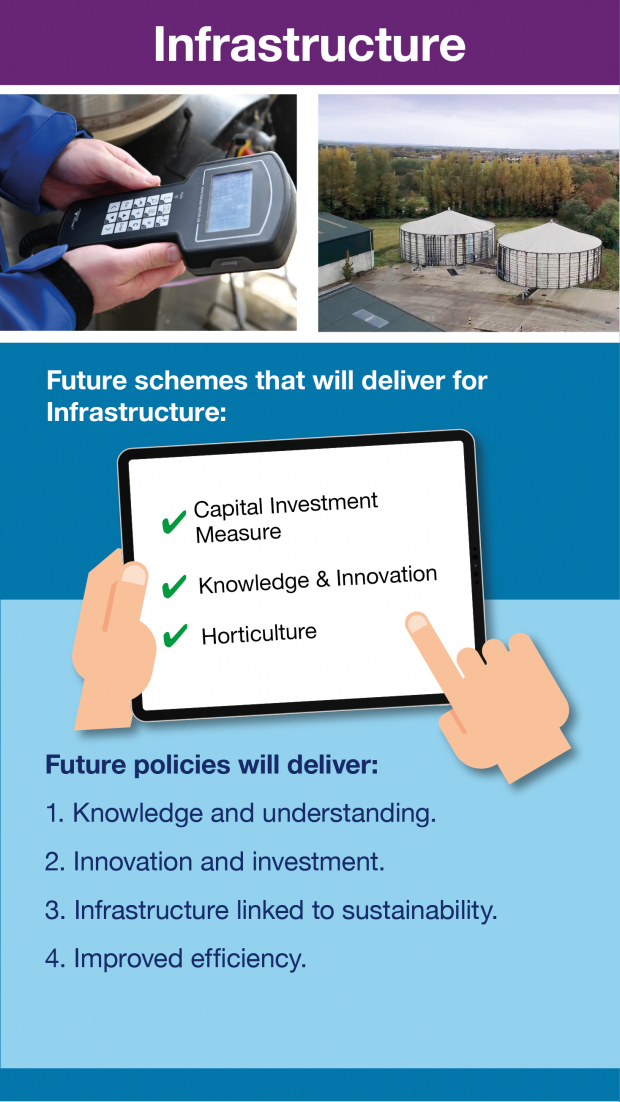
Change will be required on most farms and some of this may need capital investment. This may range from simple protective fencing (or perhaps even virtual fencing) to help manage habitats under the Farming with Nature Package, to emission-reducing equipment or buildings.
Support may also be required for the equipment necessary for the establishment of legume, clover or herb-rich swards to increase the capture of carbon, improve stock health and reduce fertiliser inputs. Farm grazing infrastructure to help utilise this forage and keep stock in fields for longer, and out of watercourses, may also be needed.
The form this capital support takes will be driven by careful analysis of scheme requirements, specific needs on farms and the need to tackle wider environmental challenges where there may be little or no direct benefit to the farm business. Processing farm waste, for example, prior to further, off-farm treatment may not be seen as an investment priority by many. However, there may be significant environmental benefits for wider society in doing this in certain circumstances. The investment required is not cheap and it is not fair that the cost burden should fall solely on individual businesses.
DAERA also wants to support innovation on farms as they try to meet the challenges ahead. One example may be the adoption of ‘virtual fencing’ to manage cattle or sheep grazing by using GPS enabled collars. This can concentrate grazing in remote areas where it may be required for habitat management purposes without the need to erect expensive fences. It can also greatly assist grazing and livestock management.
In addition to environmental sustainability, improving farm productivity is a key objective. This means that the farmer’s focus must be on driving better efficiency, not production. Farmers need to be producing the same or more from what they already have by using fewer inputs.
Each sector will face different challenges and the need for capital investment will vary accordingly. Horticultural businesses will have different needs to upland beef and sheep farms. It is important that support is provided in a flexible manner and with the ability to be adapted to meet the unique needs of each sector.
DAERA will continue to invest heavily in science, research and innovation so that new technologies and knowledge can be identified, assessed and transferred into farm businesses to provide solutions for future challenges, help to increase productivity and environmental performance and underpin sustainable supply chains.
Again, the view out of your kitchen window will start to change over the next decade. There may be a cover on the above ground slurry store or a roof over the midden for the poultry litter or collecting yard. You may have established a tree belt downwind of your livestock buildings to help disperse airborne ammonia emissions, or perhaps even a constructed wetlands to capture and deal with dirty water. The bank of the river where the cattle used to drink may now be fenced off along with the little wetland habitat in the corner of the meadow, and new grazing access lanes have perhaps helped to extend the time that stock can spend grazing their clover and herb rich pastures. These might not be major capital investments, but they are all aimed at increasing productivity, helping the environment and improving the resilience of farm businesses.
Follow links to information on Future Schemes and Measures;
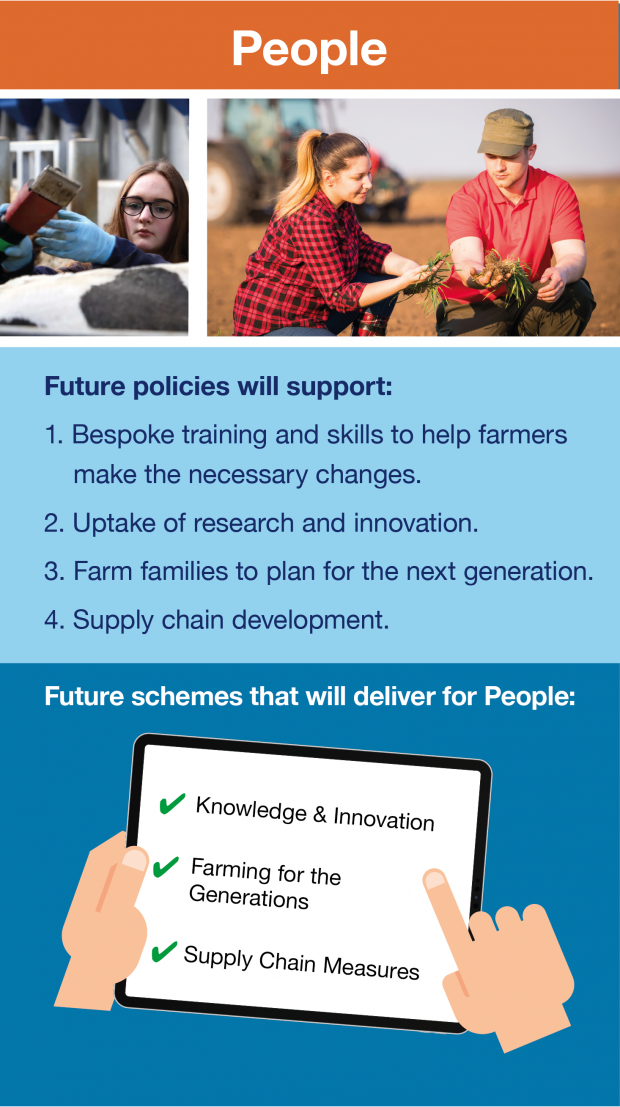
The greatest asset that the farming industry has is you, its people. In helping to achieve DAERA’s vision and outcomes for the farming industry, it is important that you embrace innovation and a greater transfer of knowledge to take the necessary steps to make changes and maximise the benefits of future schemes on your farms. Encouragement is taken from the proven success of the current Business Development Group programme and moving forward, DAERA will develop a number of knowledge and innovation programmes that will build on the successes of the current farmer-focused knowledge programmes.
These will incorporate wider ancillary industry involvement in delivery and provide opportunities for a greater number of you to be involved. You will be strongly encouraged to engage in these programmes when they become available. As an example of the opportunities that will become available to you, CAFRE is currently providing training for participants in the Soil Nutrient Health Scheme. This training will help you use the soil analysis data you receive to develop nutrient management plans for your farm to improve the efficiency of nutrient application and protect the environment.
A well-known issue within farming is the aging profile of the industry. Succession planning is a highly emotive and personal issue for many farm businesses. Through the Farming for the Generations programme, the aim is to develop a long-term approach to succession planning which respects the farmer who is stepping back and prepares the next generation to step into their role of managing and taking forward the development of the family business. Again, you will be encouraged to engage in this programme and avail of the training and mentoring support which will be provided.
Women contribute greatly to the operation of family farms in Northern Ireland and in recent years there has been a significant shift towards more females studying and working in the agri-food industry. This trend should be welcomed, and future policies will continue to address emerging needs.
There is a unique opportunity to shape this industry to ensure a sustainable and productive industry producing food, prioritising a clean, healthy environment, benefiting people, nature, and the economy, and enabling a thriving rural economy. A Supply Chain Measure will develop collaboration to achieve a better-functioning, high value-adding and sustainable agri-food supply chain.
DAERA is confident that its vision for agriculture in Northern Ireland can be achieved. The biggest obstacle might be making the necessary changes to already established approaches and behaviours. Open minds will be required and a willingness to be receptive to new ideas and practices, and to learn the skills that will be needed for a successful future. DAERA therefore, would strongly encourage you to avail of the opportunities which will be open to you through.
Future Farm Support and Development and help build a sustainable industry for many future generations. Much can be achieved where even only a little is done by many.
Follow links to information on Future Schemes and Measures;
